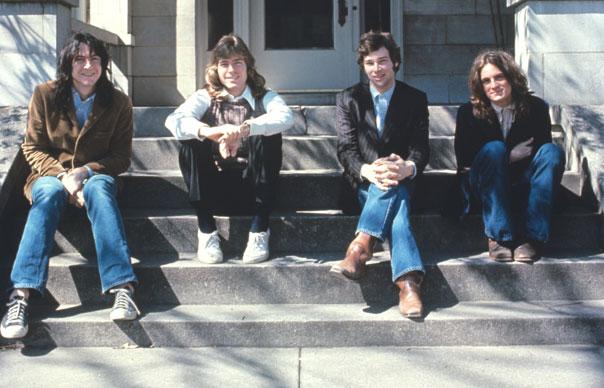It's a busy month for fans of Big Star and their mercurial leader, Alex Chilton. There is a new biography, Holly George-Warren's A Man Called Destruction: The Life And Music Of Alex Chilton, From Box Tops To Big Star To Backdoor Man, the news that the first two Big Star albums - for so many years, only available as a two-fer - are getting remastered and reissued and separate albums. And today this documentary, Big Star: Nothing Can Hurt Me, finally opens in UK cinemas two years on from its debut at South By South West in March 2012. Told in chronological fashion, the film documents the band’s coming together in Memphis in the early Seventies, subsequent falling apart, years in the wilderness and late rediscovery as well as the subsequent confounding solo careers of the band’s principal songwriters, Alex Chilton and Chris Bell. As you might suspect, the story writes itself: though the film is not without its problems. The film opens with a 1978 radio interview of Chilton: one of the few clips of him that appear in the film. We learn that after scoring a No 1 in The Box Tops with “The Letter”, Chilton, then aged 16, returned to Memphis looking for a change of direction. He hooked up with Chris Bell, a recording engineer at the city’s Ardent Studios, who had been recording with bassist Andy Hummel and drummer Jody Stephens. Bell died in a car crash in 1978, while Chilton - who refused to participate in the documentary before his death in 2010 - features in a smattering of archive clips. Stephens and Hummel, meanwhile, appear in new interviews (the film was shot before Hummel died in 2010). Co-directors Drew DeNicola and Olivia Mori find plenty of people to speak on their behalf, however: Paul Westerberg, R.E.M.’s Mike Mills, Matthew Sweet, Robyn Hitchcock, Norman Blake as well as Memphis musicians and producers, critics and family members (Bell’s brother and sister are both excellent). The relationship between Chilton and Bell provides another thread to the narrative - both sensitive individuals who complemented each other creatively, they were derailed by the downward spiral of the band’s career, ill-fated solo albums and attendant personal troubles. Inevitably, the lack of substantial archive material mean we never get as close as we’d like to Chilton and Bell. It’s understandable, of course, that a band who only recorded three albums and never had a hit in their lifetime, haven’t left the kind of hefty visual archive required to successfully fill a feature-length documentary. It’s that absence of material to adequately illustrate Big Star in full flight that arguably diminishes what could otherwise be a stunning film. http://www.youtube.com/watch?v=gxAbkqRGxqY Big Star: Nothing Can Hurt Me opens in UK cinemas today, August 1
It’s a busy month for fans of Big Star and their mercurial leader, Alex Chilton. There is a new biography, Holly George-Warren’s A Man Called Destruction: The Life And Music Of Alex Chilton, From Box Tops To Big Star To Backdoor Man, the news that the first two Big Star albums – for so many years, only available as a two-fer – are getting remastered and reissued and separate albums. And today this documentary, Big Star: Nothing Can Hurt Me, finally opens in UK cinemas two years on from its debut at South By South West in March 2012.
Told in chronological fashion, the film documents the band’s coming together in Memphis in the early Seventies, subsequent falling apart, years in the wilderness and late rediscovery as well as the subsequent confounding solo careers of the band’s principal songwriters, Alex Chilton and Chris Bell. As you might suspect, the story writes itself: though the film is not without its problems.
The film opens with a 1978 radio interview of Chilton: one of the few clips of him that appear in the film. We learn that after scoring a No 1 in The Box Tops with “The Letter”, Chilton, then aged 16, returned to Memphis looking for a change of direction. He hooked up with Chris Bell, a recording engineer at the city’s Ardent Studios, who had been recording with bassist Andy Hummel and drummer Jody Stephens. Bell died in a car crash in 1978, while Chilton – who refused to participate in the documentary before his death in 2010 – features in a smattering of archive clips. Stephens and Hummel, meanwhile, appear in new interviews (the film was shot before Hummel died in 2010).
Co-directors Drew DeNicola and Olivia Mori find plenty of people to speak on their behalf, however: Paul Westerberg, R.E.M.’s Mike Mills, Matthew Sweet, Robyn Hitchcock, Norman Blake as well as Memphis musicians and producers, critics and family members (Bell’s brother and sister are both excellent).
The relationship between Chilton and Bell provides another thread to the narrative – both sensitive individuals who complemented each other creatively, they were derailed by the downward spiral of the band’s career, ill-fated solo albums and attendant personal troubles. Inevitably, the lack of substantial archive material mean we never get as close as we’d like to Chilton and Bell. It’s understandable, of course, that a band who only recorded three albums and never had a hit in their lifetime, haven’t left the kind of hefty visual archive required to successfully fill a feature-length documentary. It’s that absence of material to adequately illustrate Big Star in full flight that arguably diminishes what could otherwise be a stunning film.
Big Star: Nothing Can Hurt Me opens in UK cinemas today, August 1


